Jun 2, 2022
`We Need More People': Trudeau Lacks Workers for His Housing Fix
, Bloomberg News

(Bloomberg) -- One of Canada’s biggest real estate developers warned that a lack of skilled workers threatens to derail the country’s effort to tackle its housing affordability crisis.
“We can’t build any more than we built in the last few years,” Michael Cooper, president of Dream Unlimited Corp., a Toronto-based real estate company, said of Canada’s housing industry. “If you want to have more units, we need more people to build.”The country’s housing crisis, caused by a shortage of affordable units and soaring prices, has been a key focus for politicians. Prime Minister Justin Trudeau has made a plan to double the pace of new home construction over the next decade a centerpiece of his budget this year, and every major party in Ontario’s provincial election Thursday has promised to add more homes through various policy tweaks too.But Canada has already been building at the fastest pace in seven decades, with the more than 20,000 apartment units to rent or buy that Dream has in its development pipeline a part of that. Despite the construction push, residential real estate values have soared about 50% through the pandemic with demand far outpacing supply. Now, Cooper says the industry, which has been contending with higher prices for building materials such as lumber and steel, is also facing a construction bottleneck because of a lack of skilled trades people to do the work. The labor shortage will take the most time to fix and whoever wins in Ontario’s election should make expanding skilled-trade education a priority, he said. Read more about how Canada’s housing market became a seller’s headache overnight.
“They should get together with developers and other people and really focus on how do you promote young people going into trades,” he said at an interview at Bloomberg News’ office in Toronto. “The average person working the trades will make over C$100,000 a year. That average — it’s a pretty good job — but it’s not something that everybody in our community thinks about as a career choice. And I think we’ve got to change that.”
To ease the affordability challenge in the meantime, Cooper said the government could consider lowering taxes on newly built units, noting that items such as sales and land transfer taxes, development fees and permits can account for 38% of the purchase price. Lost revenue from those cuts could be made up with property tax increases, shifting more of the financial burden from people trying to buy property to those who already own it, he said. In Canada, almost all of these levies are set at the provincial or municipal level. Toronto is scheduled to have a municipal election later this year.
Read more about Cooper calling Trudeau’s threat against REITS a “sideshow.”
While Canada’s residential real estate market has started to soften in recent weeks with a national measure of house prices in April posting its first decline in two years, Cooper said the shift is just the market adjusting to interest rates rising off their pandemic-era, emergency lows. The more fundamental imbalance of supply and demand at play in Canada will soon reassert itself due in part to the housing shortage and Canada’s robust population growth from immigration.
“We all thought we were building too many,” Cooper said of the boom in condo construction. But even setting affordability concerns aside, he said, “there’s not enough places for people to sleep.”
©2022 Bloomberg L.P.


